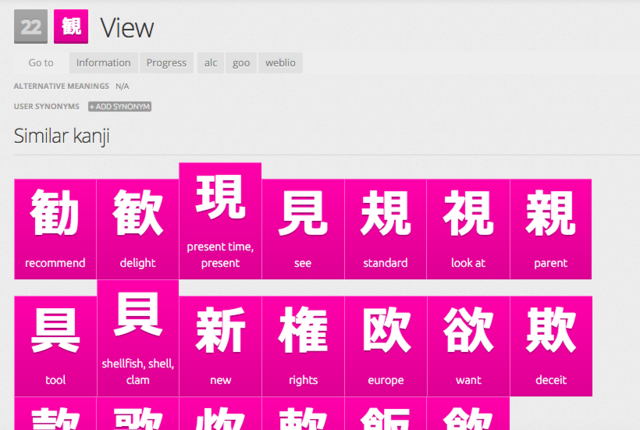Friend or Foe? Trying to remember the difference between 友 (ゆう) and 反 (はん) drives me
クレージー
.
How am I only seeing this now? Looks great!
oh hey, this is cool!
koichi said... oh hey, this is cool!Ahahaha, wow, I guess this is the biggest compliment I can get here <3
tomboy said...koichi said... oh hey, this is cool!Ahahaha, wow, I guess this is the biggest compliment I can get here <3

https://www.wanikani.com/kanji/%E6%B9%AF
and
https://www.wanikani.com/kanji/%E6%98%93
should probably be linked.
It’s over 100!
I’m really glad people find it useful ![]()

A little update: I moved the API from Heroku to openshift (it wasn’t a very pleasant experience…), hopefully the openshift instance doesn’t need to sleep 8 hours a day…
I’ll shut down the Heroku instance in a few days, so make sure to upgrade!
Edit: My bad. Didnt notice you already tried to put in review/lesson. wish i can do something about it tho :(
------
Hi tomboy!
Just wondering if this can also appear during lesson? Coz thats where i always second guess myself “didnt i learn this a while ago?”
Thanks ![]()
How come I never saw that thread before??? Thank you sooooo much. I was trying by myself to create some kind of excel document to differentiate those b******* but I had no time lately…Thank you again, and again, and again (I bow)!
Should have these two listed as similar:
https://www.wanikani.com/kanji/%E6%8E%A1
探
https://www.wanikani.com/kanji/%E6%8E%A2
採
I didn’t notice this mentioned, but there’s already a website that does this:
http://similarity.gakusha.info/
困 distressed
因 cause
I think 媛, should be grouped with the other kanji that have the football radical ![]() aka: 援, 暖, 緩
aka: 援, 暖, 緩

Edit: Also, since 聡 doesn’t have any similars listed either, 総 is pretty similar and also has the same reading ![]()
Hey, I’m struggling with not mixing up 初 and 始.
Not because thy look similar, but they have really similar vocab.
In fact they have the same vocab. 初めに 始めに
Hey sorry if it’s been mentioned but I was using the script today for the first time and noticed this:

I’m not sure why it’s doing that, but thought I would point it out. :]
https://www.wanikani.com/kanji/%E5%9B%A0
and
https://www.wanikani.com/kanji/%E5%9B%B0
Need to be marked as similar kanji.
cheru said... 困 distressedThis gave me a mini panic attack
因 cause
Hi, I tend to mix up 久 and 欠, especially when I don’t see them near each other.
Hi. Just ran across 枚 (flat objects counter) in my reviews and due to mnemonic stories instantly thought of more recent 条 (clause). They are structurally quite different but having the same radicals makes them rather hard to distinguish. It would have been helpful if the mnemonics took the structure of the kanji in consideration, for example stressing that you have to be next to the tree you are carving sheets of wood in winter, or something along those lines.
TL;DR:
枚 and 条
Reason: same radicals.